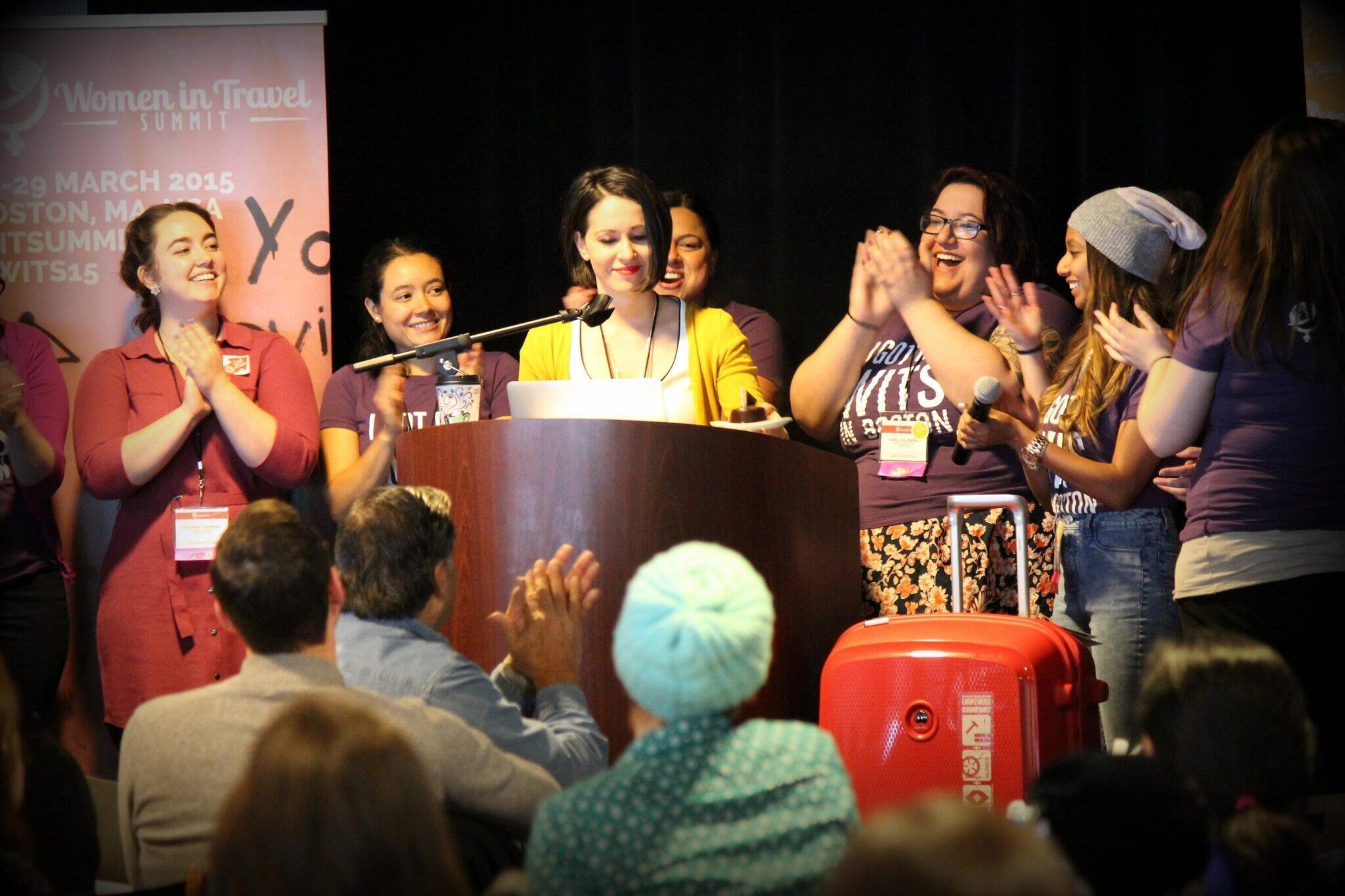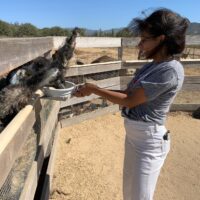An interview with the author and translator of 'The Old Woman With the Knife,' our March pick for the Fodor's Book Club.
It’s not often that a book’s central heroine is a woman over the age of 40. It’s also not a common occurrence to read about a female assassin. The main character of Gu Beyong-mo’s highly-acclaimed novel, The Old Woman With the Knife, is both.
In March’s Fodor’s Book Club pick, we meet Hornclaw (an alias, of course) a contract killer nearing retirement. At 65, she’s finally beginning to slow down, her only company being an equally aging dog named Deadweight. But after one last assignment gets her back into the field, she enters an emotional and physical game she may end up paying the ultimate price for.
The novel beautifully examines society’s expectations for aging women and is a reflection on life, death, and grief. With a dark sense of humor and a heart-clutching, race-to-the-finish-line, neo-noir drum beat, it’s both gripping and moving. As a contract killer, Hornclaw’s “invisibility” helps her, but it’s also a commentary on the “invisibility” of aging women in the world. It’s a book with a unique point-of-view, the ability to transcend and translate through countries and cultures, and relevance for our current times.
Recommended Fodor’s Video

Originally published in South Korea to rave reviews, the novel was released this month in English and translated by award-winning talent, Chi-Young Kim.
Already a distinguished and award-winning writer in South Korea, Gu has published over a dozen books including her debut, the YA title, The Wizard Bakery.
We talked to both Gu and Kim about the themes surrounding the book, how the discussion of aging in society adapts to both Eastern and Western audiences, and getting the text just right for English-speaking readers. Read on for a spoiler-free Q&A with them both.
FODOR’S BOOK CLUBWant to stay up to date with Fodor’s Book Club? Follow us on Instagram and stay tuned for our April pick, author interviews, giveaways, and much more.
Fodor’s: There are many euphemisms and code names in the book. The assassins are called “disease control specialists.” We don’t even know the real name of the main protagonist. Why did you make this choice?
Gu Beyong-mo: I would say it’s similar to the movie Léon: The Professional, where the assassin is referred to as a “cleaner.” The word “cleaner” is a synecdoche; it’s impossible to substitute that for an assassin, and by now it’s kind of a cliché. I of course didn’t want to take this metaphor that someone else had created, so I came up with the phrase “pest control specialist.” [Translation note: this was translated into English as “disease control specialist.”] I lived for a long time in an old low-rise apartment building with a mouse problem, and I had a monthly service with a pest control company. If I hadn’t had that experience, I might never have thought mice and bugs had anything to do with me. I might not have had the idea of using that phrase. I have to say it was useful that I lived in a place with a mouse problem. As for Hornclaw, she’s just Hornclaw. It’s obviously a code name, but I never had a real name in mind. I didn’t assume or imagine that someone would call her anything other than Hornclaw. It’s as if she was Hornclaw from birth. For readers, too, she can’t be anyone other than Hornclaw. I didn’t have a clear reason in not giving her another name as I was writing the novel, but looking back at it now, I think I was concerned that her having a real name would be debris jamming the story as it barreled toward a certain direction, potentially causing the narrative to crash.
How did you and your amazing translator, Chi-Young Kim, come up with the English-version code names throughout the book?
Gu: I was happy to follow Chi-Young’s suggestions. As she read the original [manuscript] multiple times with care, I trusted that she would have chosen names with the correct nuance and meaning, and it was an obvious decision because my English isn’t very good.
Chi-Young Kim: In Korean, names can have different meanings, depending on the Chinese characters used. I consulted with Byeong-mo to learn more about what characters and meanings she’d wanted to convey through the names, and then found English-language names that made the most sense for the characters. Hornclaw’s Korean name, Jogak, also means “a piece of something,” and I, unfortunately, wasn’t able to bring that double entendre into English.
Hornclaw lives a lonely and isolated life with her dog for companionship. The book has so many symbols of death and decay (the old gun, the decayed peaches). Is it all alluding to the autumn of human life?
Gu: In some ways, they could appear to be allusions to the autumn of life, but it’s important to note that something can still be done with that old gun. Just because someone is older doesn’t mean it’s the end; it could be like walking into the bustling city with beautiful designs on broken nails.
Age mellowed Hornclaw, she admits in the book. And there were many characters in the book who she could relate to as they were standing on the same junction of life (her dog, the old doctor, the elderly fruit seller, the recyclable collector). Was she making them visible in narration now that she felt invisible herself?
Gu: I wasn’t interested in revealing her motives or explaining whether she’d always been compassionate and wanted to make human connections but had built a wall around herself as she did her job, or if she didn’t have that humanity to begin with but developed it as she began aging and experienced poor treatment. As soon as that is laid out, the reader might wonder whether that process is logical and reasonable (“Is it really possible that such a cruel person could develop compassion?”) and be pulled away from the story, halting the narrative and losing the momentum needed to reach the conclusion. To take the reader to the end, I thought the novel needed a few important scenes and images, while minimizing detailed explanations about the character’s motivation. I too don’t know what is behind her actions. I’m of the opinion that while the writer is the creator, she’s also a reader, and the writer doesn’t necessarily know what the reader doesn’t know. Of course, there are times when an author writes out the characters’ feelings and intentions in an all-knowing way, but in the end, a person’s true thoughts and feelings are impossible to categorize and define. Don’t we all find it hard to truly know the motives and sincerity behind our own feelings?
Not everyone lives life like Hornclaw. But we all age. We have family members who are facing some of the issues that the book talks about. Even though she’s an assassin, do you think readers will empathize with Hornclaw because of this reason?
Gu: I think many young Korean women feel seen by this novel because the contempt Hornclaw experiences stems directly from the fact that she is an older woman. Regardless of their age, women are always objectified as receptacles of disdain or put on a pedestal, and I think readers are expressing their irritation with that sort of objectification, which they have long wanted to get beyond.
The last few years have asked us to look at human mortality. We’re all aware, more than ever, of how fragile human life is. This book also forces us to face the idea of “the end of the road.” Is this a struggle that you’ve experienced too?
Gu: I was only in my mid-thirties when I was writing this book, and I didn’t feel the sense of degeneration and destruction deep in my bones. I might have been writing about mortality in the abstract, but a writer’s instinct makes you think about what’s coming next and wonder about things you’re not personally experiencing. And that’s how I discovered the image of death from destroyed fruit that might be discarded by others.

In cultures all over the world, there are certain expectations for the elderly, but also for women. What are the societal expectations like in Korea for women and how do you see the similarities and differences between Western/American women. How do you think that impacts how readers perceive Hornclaw?
Gu: In the past, there were expectations in Korea that women would have and raise children in the home, handle the domestic sphere and support their husbands so their husbands could succeed, and dutifully take care of their husband’s parents. As women entered the workforce, an ideal woman became someone who could work outside the home and keep the domestic realm equally well. In English, you have the word “superwoman;” this expectation of women seems to be universal, beyond borders. But in Korea, there isn’t yet enough structural support for women to live well if they’re not superwomen. So women are increasingly deciding they’d rather forego marriage and children. Although women [are] routinely considered as [just a] means to an end and there is violence against women, our society is not reflecting on this situation and not taking steps for improvement. That means many women become even firmer in their decision not to have children. In the novel, it’s mentioned in passing that Hornclaw has experienced childbirth. Knowing that she wouldn’t be able to raise a child, she quickly sends the child away for adoption. This is dealt with only briefly in the book; it’s an overt rejection of what many people often expect from women: “She must be devastated to send her child away.” “Why wouldn’t she raise her own child?” “Why didn’t she cry when she went her child away?” “Where is her maternal love?”
There’s so much we could dive into regarding translating this book. Chi-Young did such an amazing job. What was the hardest element regarding translating it into English? Were there some words, phrases, or unique-to-Korean specificities that just didn’t work?
Kim: There are certain challenges that are fun to puzzle out in any project translating Korean into English. One that comes to mind for this novel is the term “disease control specialist,” as mentioned earlier. The original Korean term means “exterminator” or “pest control specialist” and, in Korean, this word comes across as euphemistic. Unfortunately in English, these terms instantly suggest death, murder, and even genocide. After playing with various options, I settled on “disease control specialist,” which gives off as vague and corporate a feeling as the Korean original.
Reading this book made us think of so many other pieces of art. What inspired you while writing this book and what things did you read, watch, or listen to, to get into the frame of mind to write Hornclaw’s story?
Gu: There are so many novels and movies about assassins, and while I wanted to write about an assassin, I didn’t have a theme or a story already fleshed out. I wasn’t inspired directly by any one movie or novel, but just thought, “An assassin as a main character is too common and not all that interesting.” Then, one day, I cleaned out my fridge and found rotten peaches. And that was how this character was born. Once I had Hornclaw, the story and themes followed her.
‘The Old Woman With the Knife’ by Gu Byeong-Mo (published by Hanover Square Press) is available now in paperback, e-book, and audiobook.
May want to check the spelling of your first line. (Heroine not Heroin) And I should add that the book does sound intriguing!





It is an amazing book. I enjoyed reading it a lot. It must be published on online reading platforms to get more readers.